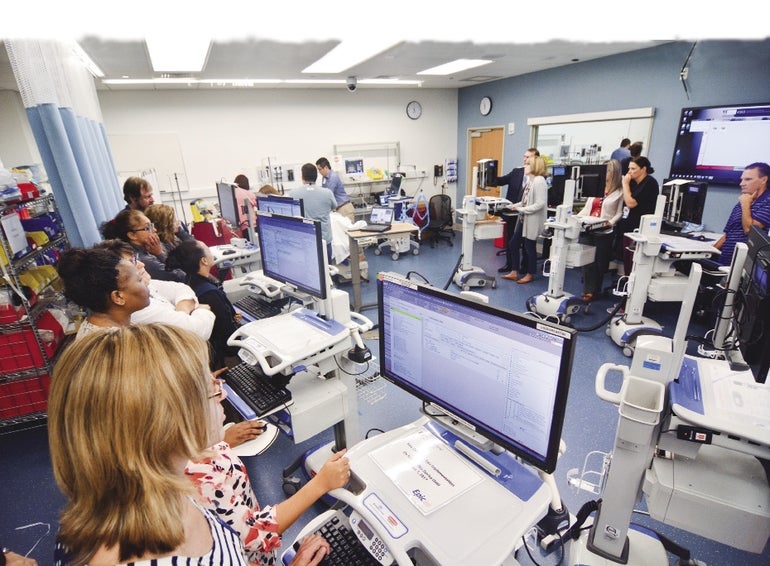Hospitals and outpatient offices owned by UMass Memorial Health Care reap the benefits of being associated with a large healthcare system, but until this week, access to state-of-the-art electronic medical records was not one of them.
The system has been recording and accessing patient information using well over 100 software programs, and sharing information between departments has often been difficult, or impossible.
“I’m kind of am starting with a blank slate, and it frustrates a lot of patients that we don’t know anything about them when they’ve gotten their care throughout the UMass system,” said John Palmgren, a long-time registered nurse in the emergency room of UMass Memorial Marlborough Hospital, one of the system’s three hospitals.
Palmgren’s comments came two weeks ago, as he was busy training coworkers on the system’s new Epic software platform, an electronic medical records solution bringing previously disjointed patient records under one system.
The new Epic system went live yesterday, Oct. 1, the date UMass Memorial executives have been preparing for over the last two years. The project involved hiring hundreds of new information technology employees and contract staff, and teaching select clinical staff, like Palmgren, how to use the software so they, in turn, can help train their peers.
Up for a challenge
Leading the charge on this $650-million project, which included upgrades to information-technology infrastructure across the system as well as the purchase and implementation of Epic, is Tim Tarnowski, the chief information officer for UMass Memorial. A seasoned IT executive, Tarnowski took the job at UMass Memorial in November 2014, knowing that a revamp of the organization’s IT system lay ahead.
“I just love these types of challenges,” Tarnowski said in an interview about three weeks before Epic went live.
Tarnowski has held several roles as head of IT for hospital systems in the Midwest and in California, and he’s led major IT transitions before. Each time, they’ve grown in scale, and Tarnowski said the UMass Memorial project is his largest yet.
“Some people think this kind of stuff is fun, and I happen to be one of them,” Tarnowski said.
That doesn’t mean it’s easy. To orchestrate an IT change of this scale, UMass Memorial made a number of big moves, including building a new IT office on Front Street in downtown Worcester, hiring nearly 400 new staff members to the information systems department, and as many as 300 contract workers to support the implementation of Epic.
Avoiding patient dangers
It all began with a kickoff meeting in December 2014, when a steering committee embarked on the challenge of finding an electronic medical records platform to make records sharing within UMass Memorial hospitals and outpatient offices seamless.
This works toward the goal of making the system more efficient by eliminating things like duplicate tests, and improving the quality of care and safety of patients. For example, with a quality electronic medical records system in place, emergency room doctors can quickly find out what medications a patient is on, avoiding dangerous drug interactions. After conducting demonstrations of several options, clinical staff ultimately settled on Epic for its functionality and integration capabilities, Tarnowski said.
Wisconsin-based Epic is a healthcare software company with offices in Europe, the Middle East and Australia. Its software platform is used by large U.S. healthcare systems, and several have been recognized by the Healthcare Financial Management Association for meeting revenue cycle benchmarks, best practices and achieving outstanding patient satisfaction.
Epic is also expensive. About one third of the $650 million IT investment was allocated for buying and implementing the platform, after UMass Memorial signed a contract with Epic in July 2015.
“We wanted integration and the best product, we thought, for our patients,” Tarnowski said.
Countdown to the launch
After signing with Epic, the system spent months customizing the platform with feedback from 1,400 clinicians across UMass Memorial. Then the software testing began, a nine-month process running from September 2016 to June, fixing defects along the way. Then training began and continued until yesterday’s launch.
UMass Memorial met every major milestone on the journey to a new electronic medical record system, but Tarnowski expected some hurdles when going live. With about 12,000 users across the system, Tarnowski is preparing for an adjustment period.
The electronic system “changes overnight for thousands of people. Although we’re training people, nothing can replace time on the system,” Tarnowski said.
The payoff
Epic replaces 120 other software solutions used to manage patient records (a few others will remain as they have unique functions that can’t be replaced). UMass Memorial is targeting a 2-percent savings per year resulting from the more efficient Epic system, meaning the upfront cost will be paid off in five years, said UMass spokesman Anthony Berry.
The opportunity to become more efficient is what organizations of all sizes should be aware of when it comes to IT spending, said Helder Machado, president and CEO of Worcester IT services firm Machado Consulting. He said companies are migrating operations, and they can save a lot of money, because monthly costs of software-as-a-service are more manageable.
Machado said sometimes, companies shy away from such transitions, fearing disruptions and glitches, and he admitted such changes can be difficult, especially for healthcare providers, which operate around the clock and are tasked with keeping people well.
“Even in best-case scenarios, there’s going to be disruption of some sort,” Machado said.
Tarnowski said patient care should not be impacted by the UMass transition. And Palmgren, the Marlborough Hospital nurse who helped train co-workers, said he wasn’t nervous at all about the change, and expected his fellow emergency care workers to pick up the new platform quickly.
“I really am excited about the ability for all staff at all different levels to communicate effectively. I think it’s going to be great for patients and the staff,” Palmgren said.

